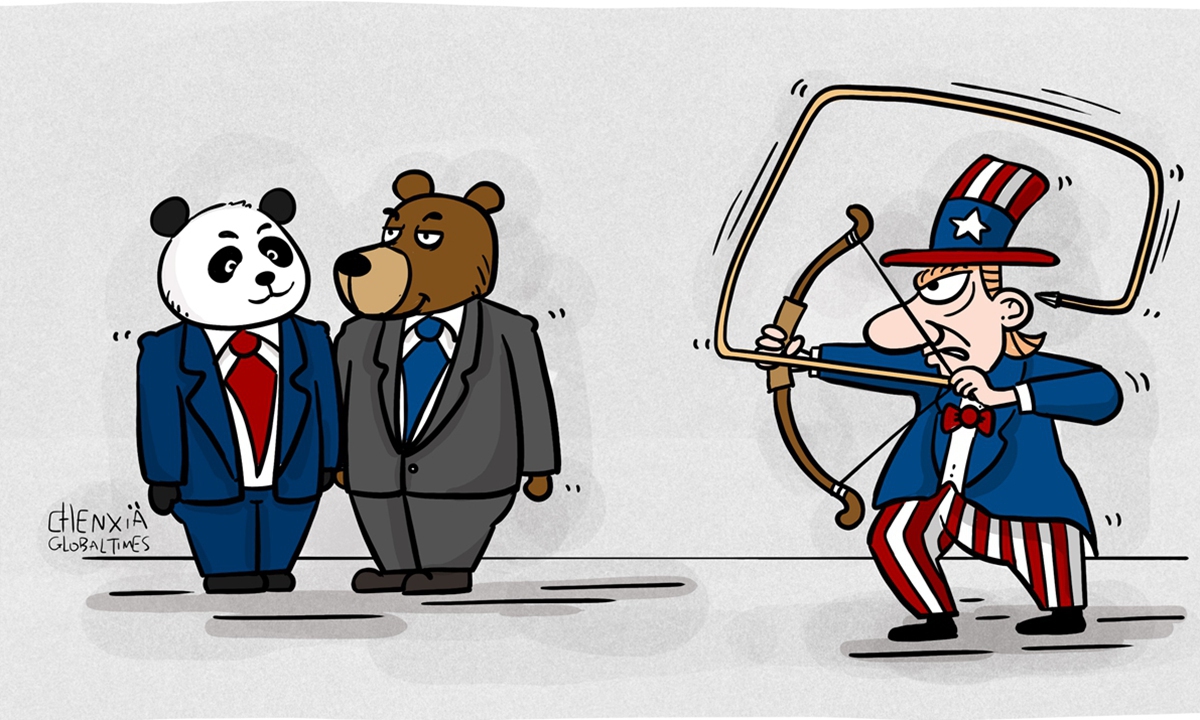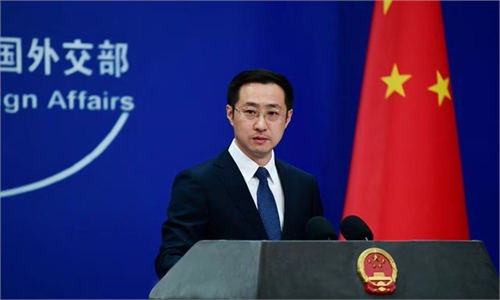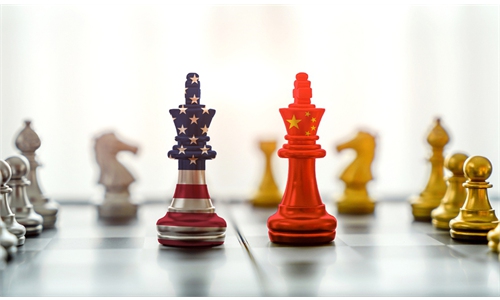After passing Ukraine aid bill, the next focus for Washington is to disrupt China-Russia trade

Illustration: Chen Xia/GT
The US House has passed an aid package of more than $60 billion to Ukraine. Due to the "betrayal" of some Republican members, there is no suspense about the Senate passing the bill quickly. A new wave of US arms will soon pour into Ukraine. Ukrainian President Volodymyr Zelensky expressed gratitude to the US and Ukraine's morale will be boosted.
The passed aid bill is just one of the actions taken by the Biden administration to reshape the battlefield situation in Ukraine. The US has also increased pressure on China. US Secretary of State Antony Blinken is scheduled to visit China from April 24. Some Western media outlets said that blocking China-Russia trade is one of the primary goals of his trip.
The US and Western media have recently been trumpeting that China is helping Russia "undertake its most ambitious expansion in military manufacturing" since the Soviet era. Senior administration officials claimed that China's inputs to Russia are "filling critical gaps" in Russia's defense production cycle, and have an impact on China-US relations.
The current battlefield situation in Ukraine is very favorable to Russia. Not only the US, but also the entire Western public opinion has been shaken on the issue of aid to Ukraine. They do not want Ukraine to become a "big funnel" and a "bottomless pit" for their own government. However, Western politicians led by the Biden administration are very insistent on winning the war. On one hand, they are trying their best to maintain the pace of aid to Ukraine. Washington has arranged more than $60 billion in aid to Ukraine, which is the bulk. On the other hand, they hope to paralyze Russia's war capabilities with sanctions, but the rapid recovery and expansion of Russia's military industry and the recovery of Russia's economy against the war have frustrated them.
US officials claimed that this was entirely because of "the support from China." US officials complained that China's support for Russia includes machine tools, drone, turbojet engines, cruise missile technology, microelectronics, nitrocellulose, etc, saying that without this support, Russia would "struggle to sustain its war effort." So their next step is to persuade China, and "it is imperative for the US and its allies to persuade China."
In addition, Western media reported that the sanctions imposed by the US and the UK on Russian metals will unexpectedly "cement China as Moscow's buyer of last resort for key commodities" and "enhance Shanghai's role as a venue to set prices for materials crucial to the global economy." They claimed that the London Metal Exchange's ban on newly produced aluminum, copper and nickel in Russia has left the Shanghai Futures Exchange as "the only major commodities bourse in the world" to accept Russian shipments of the three metals, and China has gained access to key materials with discounts, while reinforcing the yuan's status as the world's reserve currency by paying in yuan.
Some Western media outlets also claimed that if Russia wins in the conflict with Ukraine, the US will "hold China responsible." US Deputy Secretary of State Kurt M. Campbell said that Russia's win is "unacceptable" and will change "the balance of power in Europe." He added that the US will "see this not as just a Russian unique set of activities but a conjoined set of activities backed by China but also North Korea."
After overcoming the obstacles for passing the Ukraine aid bill, Washington will inevitably focus on obstructing China's trade with Russia. China will face a new game and struggle with the US in maintaining its sovereignty in foreign trade. China-Russia trade reached a record $240.1 billion in 2023, but China did not export any weapons to Russia. In contrast, the US and Europe used most of the aid to Ukraine funds to openly purchase weapons produced in their own countries and send them to Ukraine.
The US did not obtain any evidence of China exporting weapons to Russia, so it began to track the details of China-Russia trade. In addition to questioning China's increase in imports of energy and metal materials from Russia to bypass Western sanctions on these goods, it also accused China's exports to Russia of being used for military production by Russia. If this logic is followed, the entire China-Russia trade becomes "guilty," and the US' reckless use of hegemony is intolerable.
However, the Biden administration must be clear that the tools available to pressure China are limited. Washington has already put a large number of Chinese companies on the sanction list, but how effective can further sanctions be? The US tightly controls the export of chips to China, but the result is that in the first quarter of this year, China's chip production increased by 40 percent year-on-year. This has caused concern among many American industry insiders, fearing that China's chip production capacity will continue to grow rapidly under US' stimulation, gradually squeezing the profitability of American and Western companies. China and Russia are also striving to reach a deal on the construction of the "Siberian Power-2" pipeline. This will greatly expand the diversification of China's energy imports, making it more difficult for the US to strategically deter China by controlling the key energy channels in the Indian Ocean and the Malacca Strait in the future.
The House passed a bill Saturday that could potentially force the sale of the video app TikTok within a year, delaying the final decision until after the US election. This move will ease the controversy surrounding TikTok during the election. However, the situation in Ukraine will be crucial for Biden, as he needs to prevent a significant victory for the Russian military on the Ukrainian battlefield before the election. Therefore, Washington will actively promote the theory of "massive reconstruction" through China-Russia trade in the Russian military industry, redirecting the dissatisfaction of the US and the West toward China. This strategy may be reminiscent of how Trump shifted blame onto China for the COVID-19 pandemic four years ago.
Blinken's visit to China will cover a range of topics and is part of the increasing high-level exchanges between the two countries, which should help ease tensions in US-China relations overall. As for how the two sides will discuss the issue of China-Russia trade, this is an inevitable part of how China and the US handle their relationship.
The author is a Chinese media professional. opinion@globaltimes.com.cn



